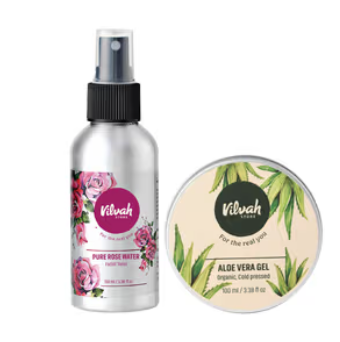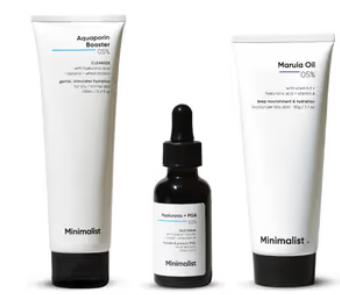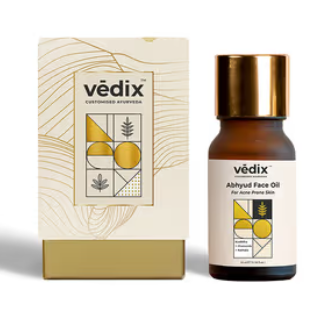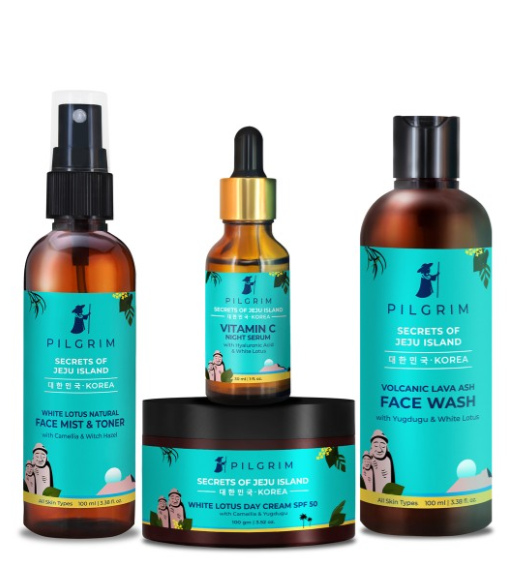Understanding the Skin Types
Sensitive Skin
Sensitive skin is a delicate balance. It’s easily irritated and prone to redness, dryness, inflammation, and discomfort. It may react negatively to certain ingredients, such as fragrances, dyes, harsh chemicals, or even changes in weather or temperature.

Dry Skin
Dry skin lacks moisture and often feels tight, flaky, and itchy. It may be caused by genetics, climate, aging, certain medications, or frequent use of harsh soaps and cleansers. Dry skin is more prone to fine lines and wrinkles.

Oily Skin
Oily skin produces excess sebum, leading to a shiny appearance and breakouts. It may be caused by hormonal fluctuations, genetics, certain medications, or a diet high in greasy foods. Oily skin is more prone to clogged pores and blackheads.

A Balanced Skincare Routine
A balanced skincare routine should address the specific needs of each skin type while avoiding ingredients that may irritate sensitive skin. Here’s a general approach:
Cleansing:
- Gentle Cleanser: Use a gentle, fragrance-free cleanser to remove impurities without stripping the skin’s natural oils. Look for cleansers with soothing ingredients like chamomile or aloe vera.
- Avoid Hot Water: Hot water can strip the skin of its natural oils, leading to dryness and irritation. Opt for lukewarm water instead.
- Double Cleansing: For oily skin, consider double cleansing with a gentle oil-based cleanser followed by a water-based cleanser to remove makeup, excess oil, and impurities.
Toning:
- Alcohol-Free Toner: Use an alcohol-free toner to balance the skin’s pH. Look for toners with hydrating ingredients like hyaluronic acid or glycerin.
- Astringent Toners: For oily skin, you may use an astringent toner to help control excess oil and tighten pores. However, use these toners sparingly, as they can be drying.
Serums:
- Hydrating Serums: For dry skin, opt for serums with hyaluronic acid or glycerin to boost hydration. These ingredients help to draw moisture into the skin and improve its barrier function.
- Balancing Serums: For oily skin, choose serums with niacinamide or salicylic acid to regulate sebum production. Niacinamide helps to reduce inflammation and improve skin texture, while salicylic acid helps to unclog pores and prevent breakouts.
- Calming Serums: For sensitive skin, look for serums with soothing ingredients like chamomile or aloe vera. These ingredients help to reduce redness and irritation.
- Vitamin C Serums: Vitamin C serums can help to brighten the skin and protect it from damage caused by free radicals. However, some people with sensitive skin may find vitamin C irritating, so it’s important to patch test before using it all over the face.
Moisturizing:
- Lightweight Moisturizer: For oily skin, choose a lightweight, oil-free moisturizer. Look for moisturizers with a gel or lotion texture that won’t clog pores.
- Rich Moisturizer: For dry skin, opt for a rich, creamy moisturizer. Look for moisturizers with ingredients like ceramides, hyaluronic acid, or shea butter. These ingredients help to strengthen the skin barrier and lock in moisture.
- Gentle Moisturizer: For sensitive skin, look for a fragrance-free, hypoallergenic moisturizer. Look for moisturizers with ceramides, which help to strengthen the skin barrier.
Sunscreen:
Sunscreen with Physical Filters: For sensitive skin, opt for sunscreens with physical filters like zinc oxide or titanium dioxide, as these are less likely to cause irritation.
Broad-Spectrum Sunscreen: Protect your skin from harmful UV rays with a broad-spectrum sunscreen with an SPF of 30 or higher. Look for mineral-based sunscreens that are less likely to irritate sensitive skin. These sunscreens create a physical barrier on the skin to reflect UV rays.

Conclusion
By understanding your skin type and following a balanced skincare routine, you can effectively address the concerns of sensitive, dry, and oily skin. Remember, consistency is key to achieving and maintaining healthy, radiant skin.
A balanced skincare routine should be tailored to your specific skin type and concerns. It’s important to listen to your skin and adjust your routine as needed. With patience and the right approach, you can achieve a clear, healthy, and glowing complexion.

0 Comments